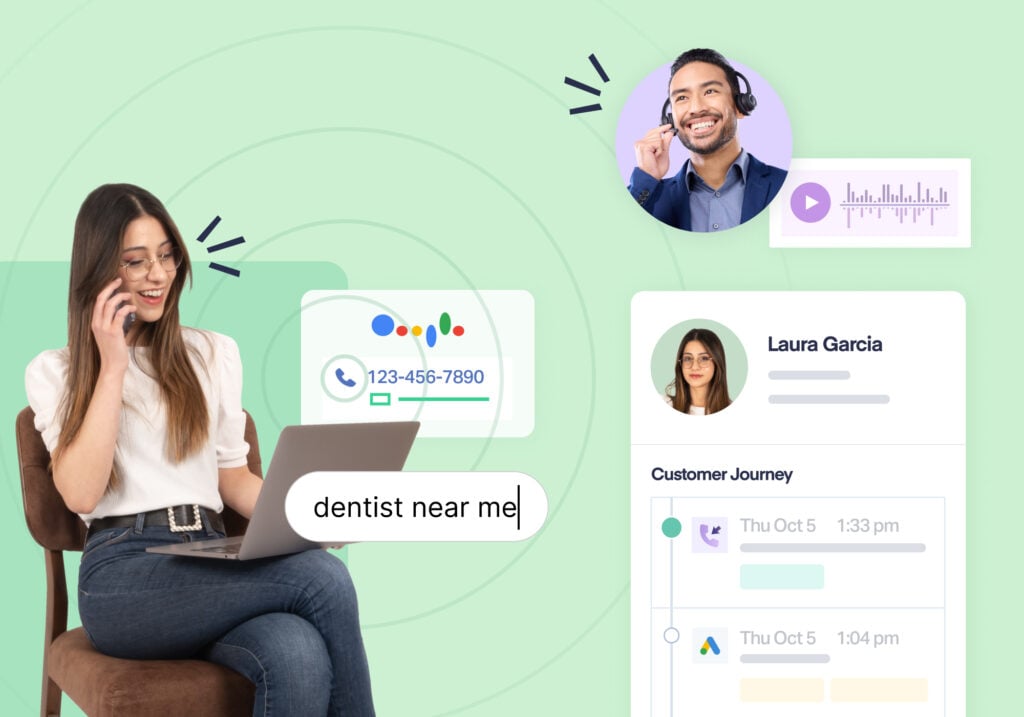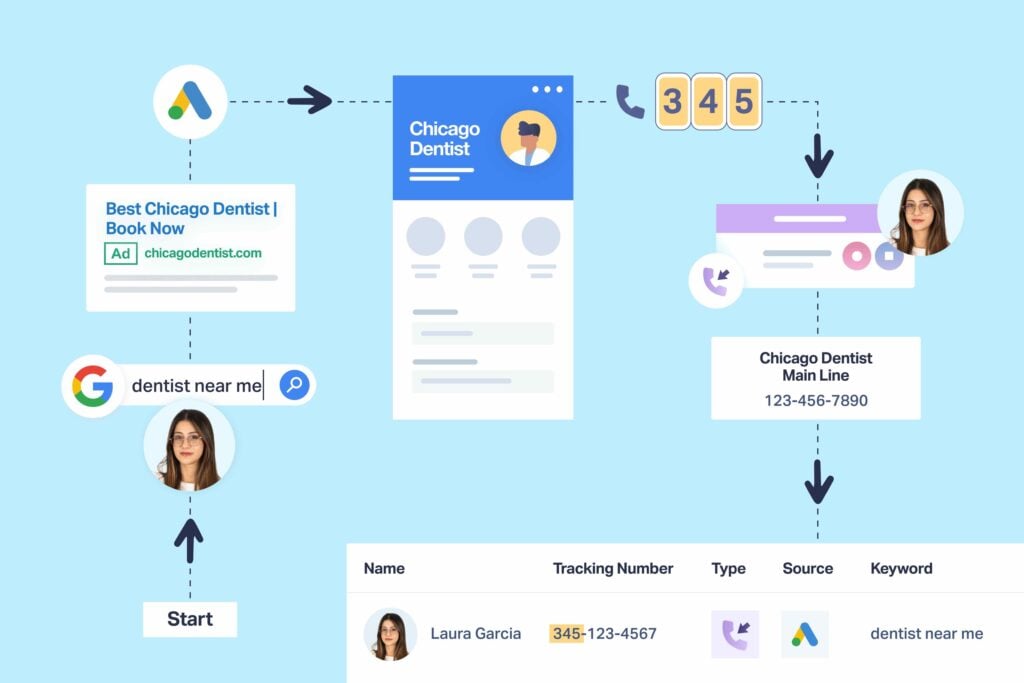
One of the best things about digital marketing is the traceability. When your customers make a purchase online, you can see exactly what ads and campaigns are responsible for bringing in those valuable leads.
But when customers call your business, the trail goes cold. You can figure out exactly what campaigns are bringing in your online purchases, but you have no idea what ads are making your phone ring.
That’s where marketing call tracking comes in. It lets you connect your digital marketing efforts to your phone conversions, giving you the same data-driven confidence in your phone lead strategies that you have in your digital ones.
What Is Marketing Call Tracking?
Marketing call tracking combines advanced call analytics with your marketing data to help you understand which campaigns drive phone calls. It goes beyond basic call tracking to tie each call to the specific campaign, keyword, or ad that generated it.
Call tracking is what makes comprehensive marketing attribution possible. Without call tracking, when a visitor clicks your ad and then calls the business directly, there’s no way to know what’s responsible for driving that lead. You can point to the correlation between your campaigns and increased call leads, but causation is virtually impossible to prove.
With a call tracking system in place, each visitor that clicks your ads will see a tracking phone number that’s unique to them. Their calls will all get forwarded to your business phone, but since each customer dialed a unique number, your tracking system can trace each call back to the exact ad, keyword, and campaign that brought them in.
The result? Clear attribution that lets you prove marketing ROI and optimize campaigns based on what actually works.
Why Call Tracking Is So Valuable
For many businesses, phone calls aren't just another conversion type—they're the primary driver of revenue. Consider these stats:
- 43% of all search-related conversions happen over the phone
- 65% of businesses say their most valuable leads come from phone calls
- Phone leads convert to customers 10-15x more often than web leads
Without call tracking as part of your marketing toolkit, you're missing a massive piece of the attribution puzzle. And that means you're likely under-reporting your marketing ROI, optimizing campaigns based on incomplete data, and missing opportunities to scale your most effective campaigns.
What Can You Do with Call Tracking?
Call tracking lets marketers prove the ROI on their campaigns that generate sales that take place over the phone. When you can tie offline call leads back to the online marketing that generated them—through channels like SEO, paid search, social media, etc.—you can calculate the actual numerical value of your marketing efforts.
The dollar amount of revenue you’ve driven is a very valuable number to have on hand when it comes time for your annual performance review or your client’s contract renewal.
Call tracking also gives marketers optimization insights on their campaigns, so they can make smart strategic decisions based on actual performance data. For instance, marketers can gather campaign-specific data like:
- Conversion rate
- Average revenue per lead
- Average cost per lead
- Return on ad spend (ROAS)
With that data in mind, marketers can then double down on the campaigns with the highest return, cut those with the lowest, and maximize their ROI.
Read More: CAMP Digital Delivers 1,570% Marketing ROI with WhatConverts
How Marketing Call Tracking Works
Call tracking works using a system called dynamic number insertion (DNI).
DNI swaps out the regular numbers on your pages for dynamic ones that change based on who’s viewing it. So rather than your ad’s landing page showing the phone number for your business or client, it will show a unique call tracking number that’s different for each visitor instead.
Call tracking software can then use cookies to tie marketing data (UTM source, medium, keyword, etc.) to that visitor’s call tracking number.
Conversation & Lead Intelligence
Some call tracking tools also offer “smart” features like Conversation Intelligence or Lead Intelligence. These features use AI to automatically gather insights from your calls and other marketing data.
Conversation intelligence uses machine learning to automatically analyze call transcripts and determine buyer sentiment using spotted keywords and other contextual information. This information can be tracked alongside your call details, making it easier to spot potential customers and filter out junk leads.
Lead Intelligence combines conversation intelligence with lead actioning capabilities. In addition to documenting key call and sentiment details, Lead Intelligence can actually mark leads as qualified and add quote or sales values automatically, based on things like:
- Call keywords
- Products or services mentioned
- Pages visited
- Ads clicked
- Whether the lead is new or returning
In other words, conversation intelligence makes it easier to evaluate leads, while Lead Intelligence qualifies and values leads for you.
Read More: Do PPC Marketers Need Conversation Intelligence or Lead Intelligence?
Best Practices for Marketing with Call Tracking
To get the most value from call tracking, you need a strategic approach that connects call data to your broader marketing goals. Here's how successful marketers and agencies maximize their call tracking ROI:
- Define Clear Goals
- What metrics matter most?
- Which KPIs will you track?
- How will you measure success?
- Set Up Proper Attribution
- Use consistent UTM parameters
- Track full customer journeys
- Enable multi-touch attribution
- Focus on Lead Quality
- Score leads automatically
- Track lead values
- Measure cost per qualified lead
- Optimize Based on Data
- Review call recordings
- Analyze conversion paths
- Test different campaigns
The WhatConverts Advantage
WhatConverts isn't just a call tracking tool—it's a complete lead tracking and marketing attribution platform built specifically for agencies and marketers.
With WhatConverts, you get:
- One tracking system for all lead types: calls, forms, chats, and more
- 70+ data points captured per lead
- Automated lead qualification
- Custom reporting
- Google Ads integration
- White-label options
Plus, our platform is built to scale with your agency, whether you're managing one client or one hundred.
Ready to Transform Your Marketing Attribution?
Stop guessing which campaigns drive calls and start tracking exactly where your call leads come from. With WhatConverts, you can:
- Prove marketing ROI
- Optimize campaigns
- Save time on reporting
- Make data-driven decisions
Start your free 14-day trial today and see why marketers trust WhatConverts for their call tracking needs.
Get a FREE presentation of WhatConverts
One of our marketing experts will give you a full presentation of how WhatConverts can help you grow your business.
Schedule a Demo
Grow your business with WhatConverts







